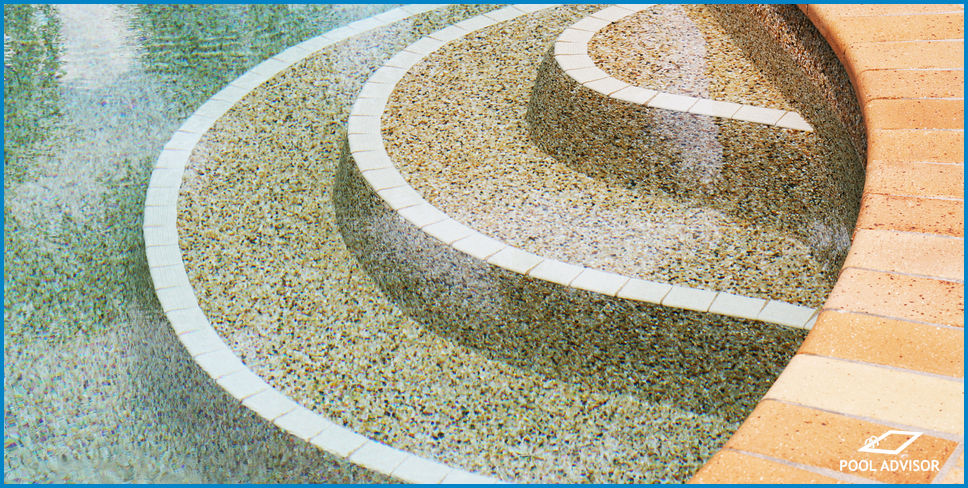
Glass Beads vs Pebblecrete - Which Finish Is Best For Your Pool?
Beadcrete and pebblecrete are both popular options for finishing the lining of your in-ground swimming pool. While pebblecrete is a time-honoured choice that is well-loved by pool owners seeking a natural aesthetic, Beadcrete is catching the eyes of those seeking a sleeker look.
What is Pebblecrete?
Pebblecrete is a fairly common swimming pool finish that is composed of natural pebbles and cement. This mixture is applied to the concrete walls of your pool and then is pressure washed to help smooth the finish.
Despite the power washing, pebblecrete has a rough, natural finish that tends to be matte in colour. Many people prefer the natural appearance of pebblecrete to other pool finishes.
Pros of Pebblecrete
Due to pebblecrete’s natural finish, it is good at hiding stains. Metal stains and organic stains are barely noticeable on these surfaces.
Pebblecrete is also a more affordable option than other finishes and it doesn’t require contracting specialised installation teams.
The easy installation of pebblecrete also makes for easier repairs. Should any damage happen to the finish of your pool, you can take repair matters into your own hands without hiring a specialist.
Pebblecrete is also long-lasting. When properly maintained through at-home care, this finish will last for about 15 years.
Cons of Pebblecrete
One con of pebblecrete is the rough finish. Although many pool owners enjoy the natural texture of the pebbles, some swimmers may find the surface to be hard on the feet.
Due to the porous nature of pebblecrete finishes, certain organic materials can be harder to remove. For example, black spot algae attaches very well to rough, porous surfaces that are common in pebblecrete pools.
Find out more in this guide on the problems with pebblecrete pools.
What is Beadcrete / Glass Beads?
Beadcrete is a pool finish that is growing in popularity due to its appearance. It consists of small, glass spheres in a specialised cement mixture that is applied to the concrete walls of your pool.
Beadcrete has a smoother finish than pebblecrete and has a more modern, clean look. It tends to be available in shades of blue that match vinyl pool linings.
Pros of Beadcrete Pools
One upside to beadcrete pools is that they are stain resistant because the main surface of the pool is composed of glass. Glass is non-porous and resists the accumulation of trace minerals in your pool water.
Another benefit to beadcrete pools is that they are known to be easier to clean. Due to the smoother surface of the finish, organic materials such as algae can usually be scrubbed away with less effort when compared to pebblecrete pools.
Beadcrete pools are also known to be more gentle on your feet than pebblecrete, because the finish is more even.
Cons of Beadcrete Pools
Beadcrete pools are expensive when compared to pebblecrete pools. Not only is the cost of materials higher, but you will need to pay a specialised installation team to get this finish on your pool and contact them when repairs or resurfacing are needed.
Here's a list of some highly recommended pool resurfacers in Brisbane.
A beadcrete finish also has a longer overall installation time than pebblecrete. This is important to consider when choosing a finish, especially if you have an opening date in mind for your pool.
Which Finish is Best for Me?
The first factor to consider when deciding between beadcrete and pebblecrete pools is your budget for your pool’s finish. Beadcrete is definitely the more expensive option, not only in terms of installation, but also regarding repairs.
If budget isn’t a deciding factor, you should also consider ease of upkeep. While beadcrete pools can be easier to clean in terms of minor accumulations of algae and other organic debris, cleaning is still not effortless. The glass elements of Beadcrete pools are also more prone to breakage, and would require a specialist’s help to fix.
Pebblecrete pools can provide a more natural option that incur less repair-related upkeep costs. Although Pebblecrete pools are not as resistant to staining as Beadcrete, many types of stains are not visible on the natural surface of the stones, minimising the need to purchase and use stain removal products.
The surface of pebblecrete pools is porous, which can allow for stubborn strains of algae to attach themselves more easily if you are not careful. However, if you are maintaining proper water chemistry, these pools are not more prone to algae than other finishes.
Pebblecrete pools may not be a good option for those seeking less maintenance, because the rough surfaces accumulate organic matter more easily if not vacuumed regularly.
Conclusion
Beadcrete pools are gaining popularity among pool owners seeking a more modern, clean finish, but this type of lining can be expensive to acquire and maintain. Pebblecrete pools are a more affordable option, but may not be as comfortable on your family’s feet or as easy to clean.
Do you have any more questions related to beadcrete vs pebblecrete pools? Leave a comment down below!

Louis
A chemical engineer by trade, Louis is committed to debunking myths in the pool industry by explaining the underlying chemistry and making it accessible to all.
